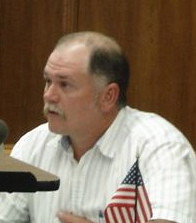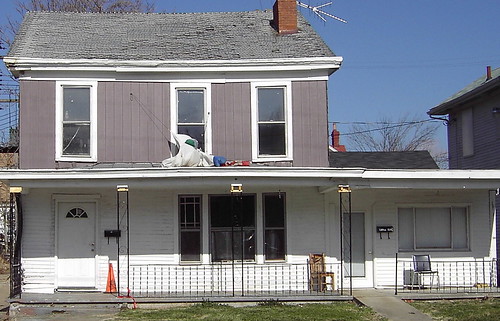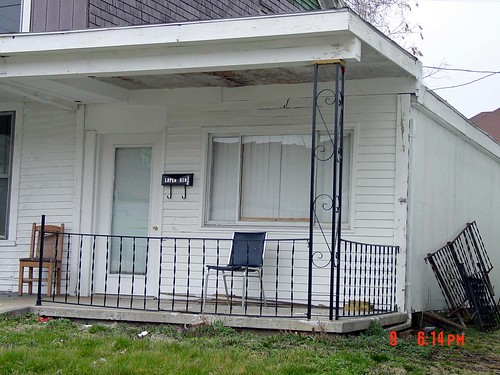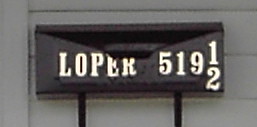519 Third Street
In recent blogs, in “Grossly Misrepresented” and “Miserable Failures,” I made the case that, at this particular time, for those of us who live in the First Ward, in the city of Portsmouth, in the state of Ohio, in the United States of America, things could not be worse politically, considering who we have representing us as president, governor, congresswoman, mayor, and councilman. I want to say more, now, about Timothy Loper, the councilman in question. I will elaborate on what I had written about him in an earlier blog, “Lord, Help Us!” Rumors that Loper has recently undergone a religious conversion only adds to the eerie symmetry between the highest and the lowest, between the White House and the First Ward. All I can say is that when incompetence, criminality, and Pentecostalism combine, “Lord, help us!”
When I told an acquaintance whose opinion I respect that I was going to interview Loper, I was warned he was “worthless,” unable or unwilling to hold a job, and like other Lopers, prone to lawbreaking and violence. I knew that Carl Loper, a member of the Portsmouth Police Dept., had slain his estranged wife with a shotgun. I knew that Carl’s son, Zane Loper, a part-time policeman, had been convicted of sexually molesting retarded children at the Mental Retardation and Developmental Disabilities (MRDD) center, and that he was serving a long prison term. Timothy Loper was not in their league, of course, but my acquaintance warned me that I and anyone else in the reform movement who helped him get elected would live to regret it.
In spite of these warnings, I interviewed Loper on the porch of his home on Madison Avenue on a humid afternoon. His wife came to the door once during the interview and one of them asked the other if the dog had been fed. They spoke like caring dog owners and like loving parents, which I'm sure they are. Loper told me of his difficulty in finding work in the
Only later did I learn that Loper himself had not been part of the recall movement. I recently talked to someone who had collected signatures in the First Ward for the recall of Sydnor. "How many signatures had Loper collected, I asked? I was told, "One!" While he did none of the work that made the recall vote on Sydnor possible, Loper offered himself as a recall candidate, much like someone who watches others plant and nurture a crop and then volunteers when it is ripe to harvest it, for himself.
It was a very close race, but Loper was finally declared the winner. But not long after he took his seat on the city council, he changed his tune and supported the Marting’s scam and voted with those other council members who are in the pocket of the SOGP, which controls
If I had checked out Loper’s rap sheet on the Portsmouth Municipal Court website, as Lee Scott was urging people in the recall movement to do, I might not have been so surprised at what a lowlife Loper showed himself to be. Among other things, his rap sheet reveals that he has a drinking-and-driving problem. He has been arrested for driving under the influence, driving with a suspended license, driving with expired tags, and driving well over the speed limit. In May 1998, his traffic problems resulted in a thirty-day sentence in the county jail, which was suspended, but he was put on probation for a year.
If driving and drinking are a problem for Loper, so is handling money. In March 1995, he and his wife were taken into court and ordered to pay a
Those are the financial and personal difficulties Loper was in at the time he decided to run for public office, first as a recall candidate, in 2004, and then for a full term, in November 2005. It seems some people, when they fail at everything else, when they are desperate enough and have no where else to turn, turn to religion and to politics. To revise a famous observation of George Bernard Shaw: Those who can, do; those who can’t do anything else, run for public office, whether it’s for the presidency of the
Councilman Loper
 The high school dropout who has trouble handling alcohol, automobiles, and money, found himself as a councilman with something other people finally were willing to pay for: his vote. He had found his calling. Like a surfer who takes somebody else's surfboard, he had ridden the recall wave into office and then had joined with those who want to make recalls even harder than they already are. Recalls are already harder, under the
The high school dropout who has trouble handling alcohol, automobiles, and money, found himself as a councilman with something other people finally were willing to pay for: his vote. He had found his calling. Like a surfer who takes somebody else's surfboard, he had ridden the recall wave into office and then had joined with those who want to make recalls even harder than they already are. Recalls are already harder, under the
Having been elected to the city council as a reform candidate in the special recall election of 2004, Loper was determined not to let his campaign promises and the city charter stand in his way of being reelected in November 2005. Since he was running unopposed, his chances of reelection looked good. There was one serious problem, however. Loper and his wife had moved out of the First Ward following the auctioning off of their
519 1/2 Third St.
There is a house in the First Ward at
The Scioto County Auditor lists
The Third St. house was built in 1900, as a private residence. At some point a shed in the rear and a narrow annex were added on the eastern side of the building. The auditor’s records suggest and others have told me that a shoe repair shop once occupied the narrow annex. The annex has been referred to more recently as a “storeroom,” and even more recently as the residence, or office, of Third Ward councilman Timothy Loper. There is an attempt to make it look like somebody lives at 519 and at
Whenever it was added, the white vinyl façade on the front lower half of the house, like the façade on the Marting’s building, is meant to hide its age. A photograph of the rear of the shingled house gives a more accurate indication of the decay – the loose shingles, the rotting gutters, the sagging frame. Judging by the exterior and especially interior condition of the house, it is very unlikely anyone lives there now. When anybody last actually lived in the house is not clear.
On
Having asserted that 519 ½ Third is Loper’s bonafide residence, Kuhn concluded the First Ward is where Loper is entitled to vote. “The standards employed by the Board of Elections to determine a person’s voting residence,” Kuhn wrote, “includes the provision that if the voter temporarily leaves the residence at which he is registered to vote, and intends to return, the voter is considered to be validly registered to vote at the address to which they intend to return.” The reason where Loper is legally qualified to vote is an important issue is that he could not continue to sit on the city council if his legal residence was no longer the First Ward.
Kuhn claimed last Oct. that Loper intended to renovate, but the only permit that has been issued for
Loper’s
In a notarized affidavit, Julie Stout testified “That Timothy Loper told me that his wife had no interest in moving back to the First Ward, and so he would find an apartment within the First Ward to fraudulently claim as his residence while continuing to reside at his current address outside the ward.” Stout also swore that Loper “hinted that money would not be an issue with him acquiring a new residence in the First Ward. I [Stout] asked him how he would get the money to get a new place that was better that the house on
The provision of the ORC that the city solicitor alluded to but, characteristically, did not specify in his 18 Oct. 2005 memo to the city council, was ORC 3503.02 (A). That provision states “That place shall be considered the residence of a person in which the person’s habitation is fixed and to which, whenever the person is absent, the person has the intention of returning.” This rule to allow someone to vote in a ward from which he or she is temporarily absent does not cover Loper’s case. Loper’s fixed place of habitation was
The issue of which ward Loper has the right to vote in is directly related to issue of whether he has the right to remain as councilman from the First Ward. If he does not have the right to vote in the First Ward, he does not have the right to serve as its councilman. If his primary residence is in the Sixth Ward, he is not qualified to remain on the city council. The Portsmouth City Charter (Section 3) states that “Any member of Council elected from a ward shall forfeit his office if he removes from said ward, and then Council shall at once fill the vacancy for the unexpired term.”
Kuhn’s claim that Loper’s living with his wife in the Sixth Ward is only temporary is something that Loper and his wife will have to swear to, because I have filed a formal challenge to the Board of Elections, asking them to investigate and hold a hearing on the matter. I believe the Board of Elections, at a minimum, has a responsibility to question Timothy and Teresa Loper to determine where they and their dog now live, and whether Loper, his wife, and his dog intend to settle permanently in that storage room at
Loper should not be allowed to continue to lie about his place of residence, because it makes a mockery of the Portsmouth City Charter, the Ohio Revised Code, and the spirit of honest democratic government. This shameful situation raises the question of whether
Think of 519 Third Street as the house where Portsmouth’s culture of prostitution is shamelessly practiced, as a kind of annex to the city council chambers, and when every church and building of notable architectural and historical importance in Portsmouth is torn down to make way for parking lots and shopping malls, let 519 Third St. remain, along with the Marting building, as a monument to the vices of our river city, so that a hundred years from now parents can take their children by it and say, “There, ninos, is the house of ill repute, where a gringo councilman claimed he lived, back in the days when criminals and corrupt politicians and developers controlled this city, and no one believed it could ever be any different.”



